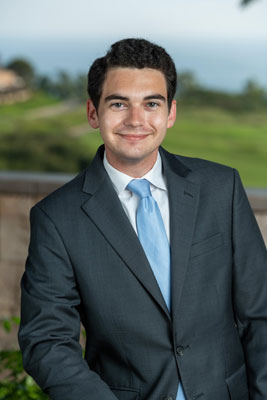Daniel Shapiro (’18) lands U.S. Supreme Court Clerkship

Daniel Shapiro (‘18) will clerk for Supreme Court Justice Clarence Thomas during a soon-to-be determined term. “It's an incredible honor,” says Shapiro. “Working for Justice Thomas, in particular, is really humbling.” To those who know Shapiro, this achievement comes as no surprise. He is described by faculty as a tenacious and accomplished individual. Shapiro graduated magna cum laude in 2018 and was awarded the Daniel D. Polsby Award for Excellence in Leadership. He is the second Scalia Law student to be awarded a clerkship in the highest court of the land.
Shapiro attended the University of South Florida, where he had the opportunity to serve on the student government supreme court. This experience, coupled with his interest in U.S. history, motivated him to apply to law school. “I was reading a lot of interesting originalist scholarship about the original public meaning of the Constitution,” says Shapiro of the pre-law courses he took in undergraduate school. “And I realized my passion for history would fit perfectly in the growing conservative legal movement that was excavating the history behind a lot of the constitutional provisions. So, then it was pretty natural that Mason was where I would want to go.” He also cites Scalia Law’s proximity to D.C. as a reason he chose to attend. “There would be days where I would be going to work at the White House complex in the morning… and then going to school, learning federal courts from an amazing professor or federal judge, and then practicing moot court after that,” recalls Shapiro. “You can't get that experience anywhere else.”
While at George Mason and post-graduation, Shapiro secured numerous prestigious positions that ultimately led to his illustrious clerkship at the Supreme Court. During his 1L summer, he worked for the U.S. Court of Appeals for Veterans Claims. He went on to intern at the Department of the Treasury, the Department of Defense, and the White House Office of Information and Regulatory Affairs. He describes these opportunities as invigorating, foundational experiences that allowed him to develop a sense of what a career in D.C. could look like.
Throughout law school, Shapiro also served as a research assistant to numerous GMU Scalia Law professors, including Neomi Rao, with whom Shapiro worked at the White House Office of Information and Regulatory Affairs, where Rao served as Administrator. Working with then-Administrator Rao almost full-time during his 3L spring, Shapiro saw firsthand how regulations are coordinated and shored up against legal challenges and was able to work in a fast-paced environment that gave him experience within the Executive Branch. After graduating, Shapiro clerked for the Honorable E. Grady Jolly on the United States Court of Appeals for the Fifth Circuit in Jackson, Mississippi.
When Neomi Rao was confirmed to the D.C. Circuit Court of Appeals, Shapiro clerked for his former professor, beginning in July 2019. He describes Judge Rao as hugely influential and an outstanding mentor. “I can’t say enough good things about Judge Rao,” he says. “She’s an incredible person, [who] taught me to always look for the right answer.” After this clerkship, Shapiro went on to work as an associate at Consovoy McCarthy PLLC, a litigation boutique law firm in Arlington.
Shapiro describes his Supreme Court clerkship with Justice Thomas as a tremendous honor. “There's no one doing more good for the Constitution in our country right now than Justice Thomas,” attests Shapiro. “And to be able to contribute to that in any way possible is really the opportunity of a lifetime. Particularly with Justice Thomas’ jurisprudence and his serious focus on history. He's really revolutionized originalism and is doing the work in restoring the original meaning of the Constitution.” Shapiro hopes that he will be able to contribute to Justice Thomas’ judicial philosophy, which, he says, is vital to restoring the framework that the Founding Fathers enacted in 1787. “If we're going to return to our first principles,” he explains, “it’s going to take the hard work that the Justice does… His method, his serious commitment to getting to the right answer and not taking any shortcuts is incredible and it's exactly what this country needs.” Shapiro is especially looking forward to his role in research, which will be crucial in getting to the root of these difficult legal questions.
In terms of a vision for his career trajectory, Shapiro wants to focus on advancing the ultimate goal of making the government more constitutional. “It’s all about fighting for the founding principles… that’s what I’m really committed to.” He adds that while excavating and restoring the original meaning of the constitution entails a lot of hard work, he believes this work is key to rescuing the U.S. from crisis.
Shapiro also sees his clerkship as an opportunity to extend the networks he built during his time at George Mason Scalia Law School. Above all, he is grateful to those who supported him in the process of applying for the Supreme Court clerkship. “It was just amazing, the support network that I had from Mason,” he says, noting Professors Michael Krauss, Jennifer Mascott, Steven Menashi, and Adam White as influential figures. “It was really having that group of mentors that set me up in the position where I needed to be… It’s a real blessing that you have at Scalia Law School. Professors’ doors are always open and they’re just the best mentors you could hope for. Best decision I could have made was going to Scalia Law School.”